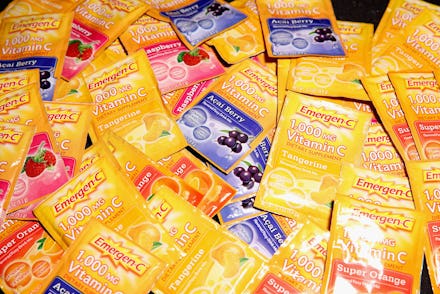Emergen-C and Airborne aren't backed by science, so good luck with that cold

Many Americans sniffle their way to the cold and flu aisle at the pharmacy when cold season starts. But supplements like vitamin C and zinc aren't the cure-alls they're made out to be.
In fact, Emergen-C faced a $6.45 million settlement in 2014 because the company allegedly used misleading statements on packaging and in advertising.
Similarly, Airborne faced a $23.3 million settlement in 2008. It was investigated for claims related to its "Miracle Cold Buster," the Center for Science in the Public Interest reported.
"There's no credible evidence that what's in Airborne can prevent colds or protect you from a germy environment," CSPI senior nutritionist David Schardt said in the report.
Let's take a look at the product claims and compare them to science, shall we?
Emergen-C Super Orange
The nutrition label boasts: 1,000 mg vitamin C (1,667% of daily recommended intake) and several other vitamins and minerals.
The claims: Vitamin C "is essential in maintaining a healthy immune system," Emergen-C writes on its website. 1,000 mg of vitamin C is equivalent to 11 glasses of OJ, Greatist noted.
Airborne Effervescent Tables with Vitamin C
The nutrition label boasts: 1,000 mg vitamin C, (1,667% of daily recommended intake), 8 mg zinc (53% recommended intake) and several other vitamins and minerals.
The claims: Airborne's site writes, "Vitamin C is an antioxidant that goes to work on a cellular level to adjust high levels of stress hormones and enhance the function of immune cells throughout your body."
Zinc, meanwhile, "works as a trigger for over 200 different enzymes, which perform a range of tasks like building DNA or aiding vitamin A absorption," Airborne writes.
The science of vitamin C and zinc
There's not a lot of proof that loading upon vitamin C will help prevent sickness, the Mayo Clinic states, noting that it might help certain people with compromised immune systems, like military personnel or marathon runners.
"Vitamin C has been intensively studied for its crucial role in normal immune function," Marci Clow, registered dietician at Rainbow Light, said in an email.
But there's no scientific literature that demonstrates downing vitamin C, let alone 1,000 mg of the stuff, works as prevention from catching the office cold, Clow said.
Zinc, on the other hand, holds some promise towards making common colds less miserable. Clow noted that zinc "may reduce the length of a cold" if taken within 24 hours of your first symptoms. The mineral could be helpful in reducing rhinovirus from setting up shop in your mucus, Mayo Clinic noted, though it cautioned that many of the studies on zinc have been small.
When reached for comment on the efficacy of Emergen-C, a spokesperson provided the following statement via email:
For your information, the Emergen-C brand is not marketed to prevent or treat symptoms of the common cold and therefore, we are not best suited to address questions on this topic.... Emergen-C is not a replacement for a balanced diet.
Airborne did not immediately respond to a request for comment.
Here's what can help protect you from sneezing coworkers and germy public transportation: Good old fruits, veggies and other nourishing real foods. "Consuming a variety of fruits, vegetables, whole grains and lean protein daily is the best way to nourish our bodies and support immunity," Clow said. Head colds can make people lose their appetite, but food can help speed up recovery, she said.